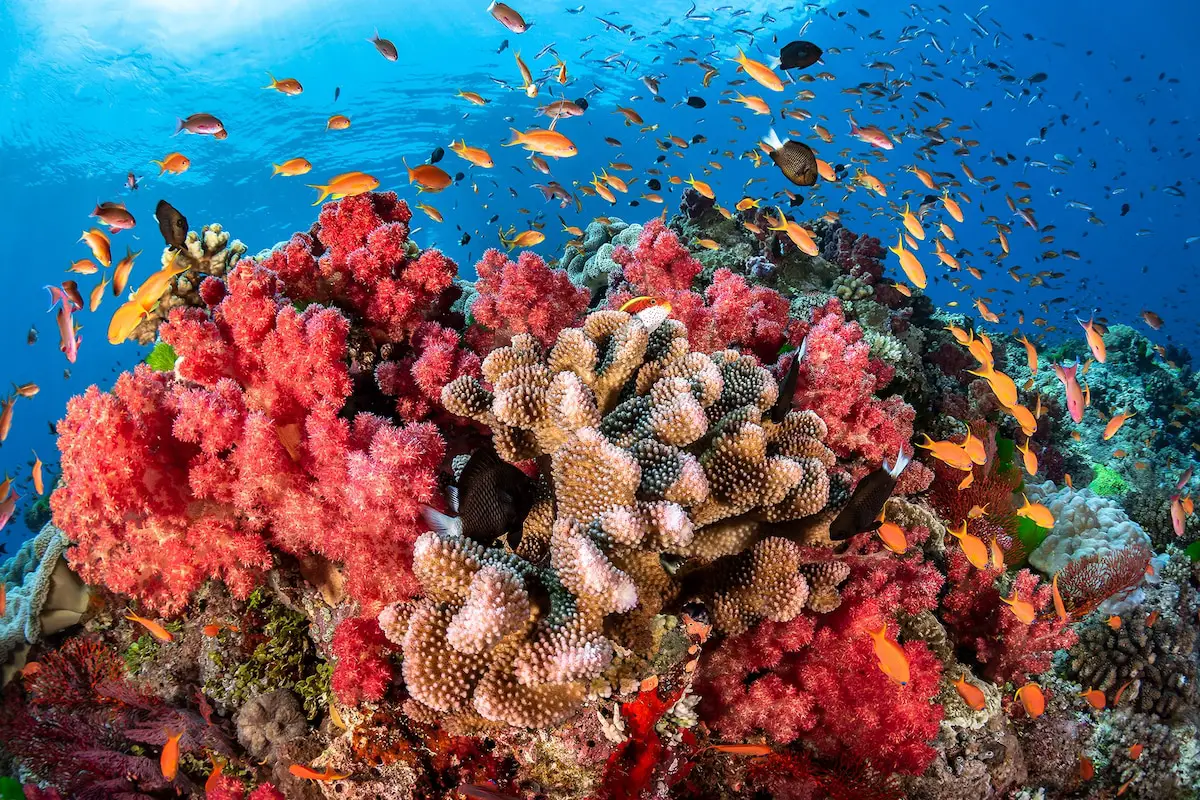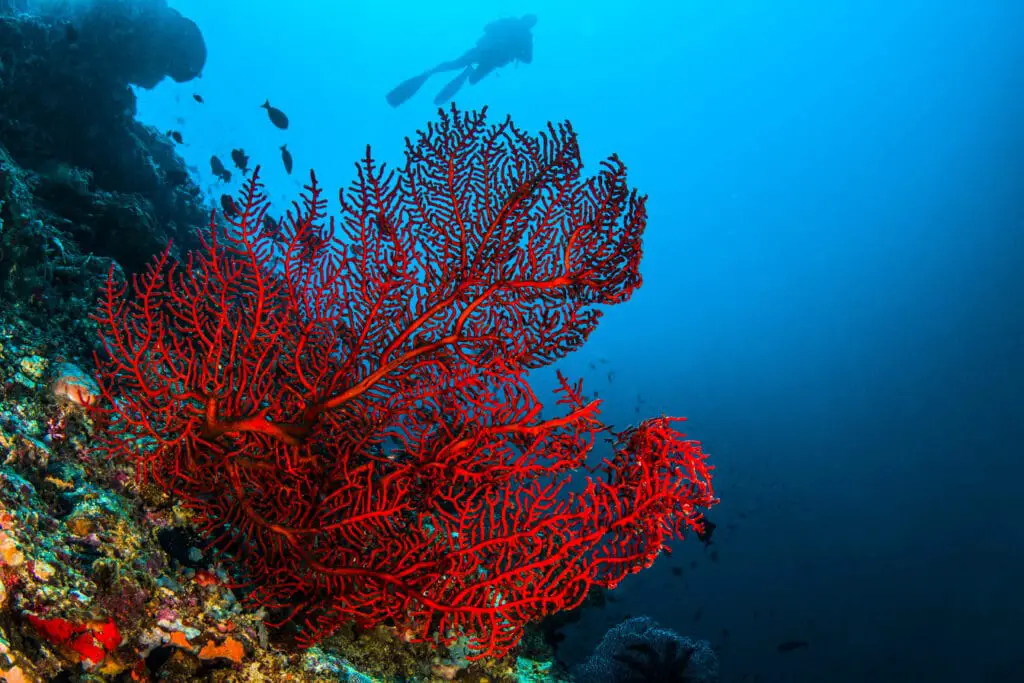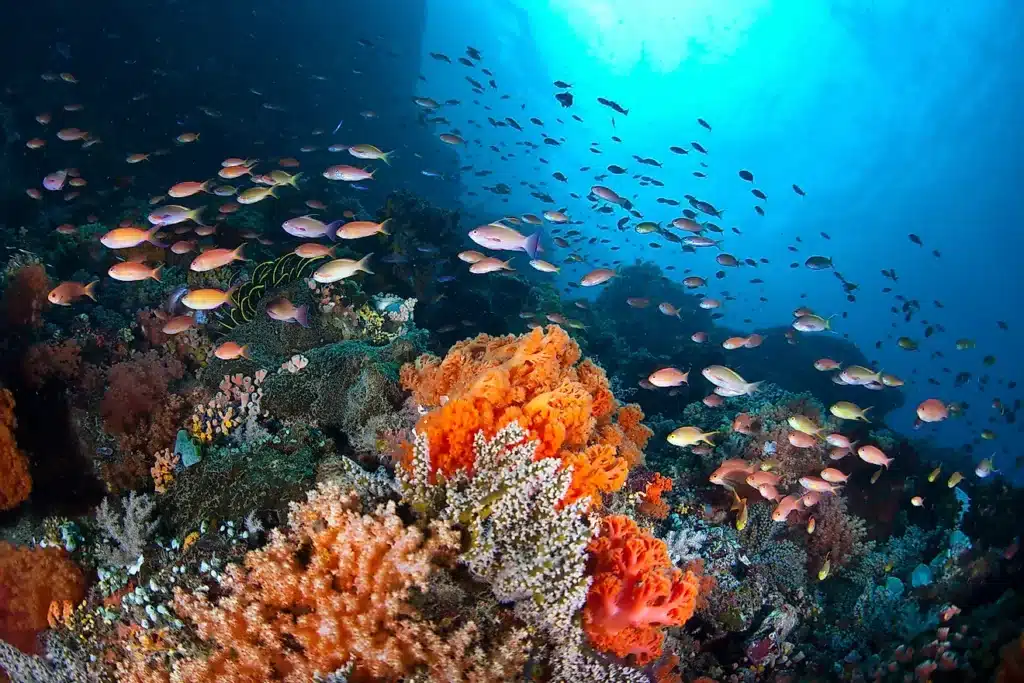Is Coral A Decomposer

Introduction
Is Coral A Decomposer: Coral reefs are among the most diverse and ecologically significant ecosystems on our planet, providing a habitat for a remarkable array of marine life. These intricate structures are often celebrated for their vibrant colors and breathtaking beauty, but their ecological functions extend far beyond aesthetics.
Decomposers are organisms that play a crucial role in breaking down dead organic matter and recycling nutrients within ecosystems. Typically, decomposers are associated with terrestrial ecosystems, such as forests and grasslands, where they facilitate the decomposition of fallen leaves, dead animals, and other organic material.
Coral reefs are primarily composed of tiny polyps that secrete calcium carbonate to build their skeletons. These polyps, in symbiotic relationships with photosynthetic algae called zooxanthellae, create the intricate structures we recognize as coral reefs. While corals are not traditional decomposers in the sense of breaking down organic matter like fungi or bacteria, they do play a crucial role in nutrient cycling within the reef ecosystem.
We will delve into the fascinating world of coral reefs, examining the role of corals in nutrient cycling and their contributions to the overall health and sustainability of these invaluable ecosystems. Through a deeper understanding of coral’s ecological functions, we can gain insight into the intricate web of life that makes coral reefs such a vital component of our planet’s biodiversity.

Is coral a consumer or decomposer?
The corals get energy from the algae so in this sense are primary consumers. Corals are also secondary consumers at the third trophic level, because they also eat zooplankton and other small organisms they catch with their tentacles. Zooplankton that eat phytoplankton are primary consumers at the second trophic level.
The classification of coral as a consumer or decomposer is a fascinating topic that highlights the intricate role these organisms play in marine ecosystems. While coral doesn’t fit neatly into either category, it exhibits traits of both consumers and decomposers to varying degrees.
Coral polyps are primarily considered consumers. They are filter-feeders, extending tiny tentacles to capture plankton and other microscopic organisms from the water. In this sense, they are akin to herbivores or primary consumers, as they obtain their energy by consuming other living organisms.
While they do not break down dead organic matter directly, the calcium carbonate skeletons they create eventually become part of the reef’s substrate. Over time, these skeletons weather and erode, releasing calcium and other minerals back into the ecosystem. This process contributes to the overall nutrient cycling within the coral reef ecosystem.
Are corals a producer?
Coral reefs are not producers, because they are not plants. Plants and algae are examples of organisms that are producers, which are able to undergo photosynthesis to make food. Coral are animals, despite their hard, non-mobile appearance, and animals are consumers.
Corals are not considered producers in the traditional sense of the term within ecological contexts. In ecology, producers are organisms that can harness energy from non-living sources, typically through photosynthesis or chemosynthesis, to synthesize organic matter from inorganic compounds. Examples of producers include plants on land and phytoplankton in aquatic environments.
Corals, however, do not possess the ability to directly produce organic matter from non-living sources. Instead, they are reliant on a mutualistic relationship with photosynthetic algae called zooxanthellae. These microscopic algae live within the coral polyps and perform photosynthesis, converting sunlight into energy and producing organic compounds, such as sugars. The coral polyps benefit from these organic compounds, as they serve as a significant source of nutrition and energy for the corals.
In this symbiotic partnership, corals act more as consumers, as they primarily feed on plankton and other small organisms by extending their tentacles and capturing prey from the surrounding water. While they do consume these organisms, they are not classified as producers because they do not independently generate their own energy through photosynthesis or chemosynthesis.
Corals are not producers but rather consumers that rely on the photosynthetic activities of their symbiotic zooxanthellae for their energy needs. This intricate relationship highlights the complexity of coral reef ecosystems and the interdependence of various organisms within them.
Is coral a primary producer?
Reef-building corals and algae are the most abundant primary producers on coral reefs, and I use coarse functional groupings categorized as reef-building corals, fleshy macroalgae, calcareous macroalgae, crustose coralline algae (CCA) and turf algae assemblages.
Primary producers are organisms capable of synthesizing organic compounds, typically through photosynthesis or chemosynthesis, using energy from non-living sources. These producers form the foundational level of the food chain by converting energy from the sun (in the case of photosynthesis) or chemical reactions (in the case of chemosynthesis) into organic matter.
Corals, however, do not possess the direct capability for photosynthesis or chemosynthesis. Instead, they have a mutualistic relationship with photosynthetic algae called zooxanthellae. These microscopic algae live within the coral polyps and perform photosynthesis, converting sunlight into energy and producing organic compounds like sugars. The coral benefits from these organic compounds, which serve as a significant source of nutrition and energy.
While corals indirectly benefit from the photosynthetic activities of their symbiotic zooxanthellae, they themselves do not engage in primary production. They are better classified as consumers because they obtain their primary source of energy by capturing and consuming plankton and other small organisms using their stinging tentacles.
What is one decomposer in the coral reef?
The decomposers are the polychaete worm and the queen conch. How is energy transfered through a food web? Energy is transfered through the consumption of organisms.
One of the prominent decomposers in coral reef ecosystems is detritivorous marine worms, specifically species like the Bristleworms (Polychaeta). These segmented worms play a crucial role in breaking down organic matter within the reef environment.
Bristleworms are opportunistic feeders that scavenge on dead organisms, decaying plant material, and other detritus that settles on the ocean floor and within crevices of coral reefs. They use their bristle-like appendages (parapodia) to capture and shred organic matter, aiding in its decomposition. This process is essential because it helps recycle nutrients and return them to the ecosystem.
As they feed on detritus, Bristleworms release nutrients back into the water, making them available to other organisms within the coral reef community. This nutrient cycling is a vital component of reef health, as it contributes to the overall productivity and sustainability of the ecosystem.
These decomposers play a pivotal role in breaking down organic material and recycling nutrients, ensuring that the coral reef ecosystem remains healthy and balanced. Their work underscores the interconnectedness of all life forms within the reef, from the smallest decomposers to the grandeur of the corals themselves.
What does coral eat?
Food. Some corals eat zooplankton (tiny drifting animals) or small fishes. Others consume organic debris. Many reef- building corals derive their nutrition from zooxanthellae.
Coral, despite its stationary and rock-like appearance, is a living organism with unique dietary requirements. Corals are primarily carnivorous, relying on a combination of strategies to feed and thrive in their underwater habitats.
One of the primary sources of sustenance for corals is plankton. They extend tiny tentacles armed with specialized cells called cnidocytes, which release venomous harpoons to immobilize passing planktonic prey. Corals then use their tentacles to pull the captured plankton into their mouths.
Apart from plankton, some coral species engage in a symbiotic relationship with photosynthetic microorganisms known as zooxanthellae. These tiny algae reside within the coral’s tissues. In return, the corals offer protection and a stable environment to the zooxanthellae.
While most corals are carnivorous or engage in symbiosis with zooxanthellae, some larger coral species, like the mushroom coral, can also catch small prey, such as small fish and crustaceans, using their stinging tentacles.
Coral’s diet primarily consists of plankton and the nutrients produced by their symbiotic relationship with zooxanthellae. This dietary versatility allows coral to adapt to various environmental conditions and maintain their intricate ecosystems in the world’s oceans.
What is one decomposer in the coral reef?
The decomposers are the polychaete worm and the queen conch. How is energy transfered through a food web? Energy is transfered through the consumption of organisms.
One crucial decomposer in the coral reef ecosystem is the detritivorous sea cucumber. Sea cucumbers are fascinating marine creatures that play a vital role in breaking down organic matter on coral reefs. They are often referred to as “nature’s recyclers” due to their role in the decomposition process.
Sea cucumbers feed on detritus, which includes dead plant and animal material that accumulates on the ocean floor and within the reef. Their specialized feeding tentacles sift through the sediment, extracting organic particles and bacteria. As they ingest this detritus, they digest the organic material and return vital nutrients back into the ecosystem through their waste.
Without detritivores like sea cucumbers, dead organic matter would accumulate on the reef, potentially leading to oxygen depletion and harmful changes in water chemistry. Sea cucumbers, along with other decomposers like certain species of crabs and worms, help recycle nutrients, maintaining a cleaner and more sustainable environment for coral reefs to thrive.
Why are decomposers important in coral reefs?
Decomposers, which include bacteria and fungi, break down organic waste material and return essential elements, such as nitrogen and phosphorous, to an ecosystem.
Decomposers are of paramount importance in coral reef ecosystems due to their critical role in maintaining ecological balance and sustaining the health and vitality of these underwater communities. Several reasons highlight the significance of decomposers in coral reefs:
Nutrient Recycling: Decomposers, such as bacteria, fungi, and detritivorous organisms like sea cucumbers, break down dead organic matter, including coral polyps and algae. By doing so, they release essential nutrients like nitrogen and phosphorus back into the ecosystem. These recycled nutrients become available for uptake by coral and algae, promoting their growth and overall reef productivity.
Waste Management: Coral reefs are dynamic environments with constant turnover of organisms. Decomposers help remove the remains of dead organisms and prevent the accumulation of decaying matter, which could otherwise lead to water quality deterioration and habitat degradation.
Disease Control: Decomposers play a role in managing coral diseases. They can consume diseased tissue, limiting the spread of pathogens within the reef and aiding in the recovery of affected corals.
Ecosystem Resilience: Coral reefs face numerous threats, including coral bleaching, pollution, and climate change. Decomposers contribute to the resilience of these ecosystems by assisting in recovery processes after disturbances. They help clear debris and facilitate the reestablishment of healthy coral and algae communities.
Decomposers are integral to the functioning and survival of coral reefs. They ensure the efficient cycling of nutrients, contribute to waste management and disease control, and bolster the reef’s ability to recover from environmental stressors, making them indispensable for the overall well-being of these diverse and fragile marine ecosystems.
Are coral fungi decomposers?
Most coral fungi are decomposers, helping to break down dead plants and animals in forests or grasslands.
Coral fungi are not typical decomposers in the same way that bacteria, fungi, and detritivorous organisms like sea cucumbers are in terrestrial ecosystems. Coral fungi are a type of fungi that form symbiotic relationships with certain species of coral, particularly in deep-sea environments. This relationship is known as a mycorrhizal association.
In mycorrhizal associations, coral fungi do not function as traditional decomposers breaking down dead organic matter. Instead, they provide essential nutrients, such as phosphorus, to the coral in exchange for carbohydrates produced through the coral’s photosynthesis. This mutualistic partnership enhances the coral’s ability to survive in nutrient-poor deep-sea environments.
While coral fungi are not decomposers in the sense of breaking down detritus and organic matter, they play a specialized role in nutrient cycling within the coral’s microenvironment. Their unique function highlights the complexity and diversity of interactions in coral reef ecosystems. Other decomposers, such as bacteria and detritivores, are responsible for the breakdown of dead organic material in coral reef environments, recycling nutrients and maintaining ecosystem health.

Conclusion
Coral reefs are bustling communities of life, where every species, from the smallest plankton to the largest predators, plays a role in maintaining balance. Corals, with their intricate structures, serve as the foundation upon which this web of life is built. Through their interactions with zooxanthellae and their ability to filter-feed, corals capture and recycle nutrients, playing a pivotal part in sustaining the diverse array of species that call reefs home.
The calcium carbonate skeletons that corals create, while not organic matter themselves, eventually break down over time, contributing to the reef’s overall nutrient pool. This slow but continuous process adds another layer to coral’s involvement in nutrient cycling.
While corals may not fit the traditional image of decomposers, they are ecological engineers that help maintain the health and resilience of coral reef ecosystems. Recognizing the significance of their role in nutrient recycling underscores the urgency of conserving these ecosystems, which are under threat from factors such as climate change, pollution, and overfishing.



